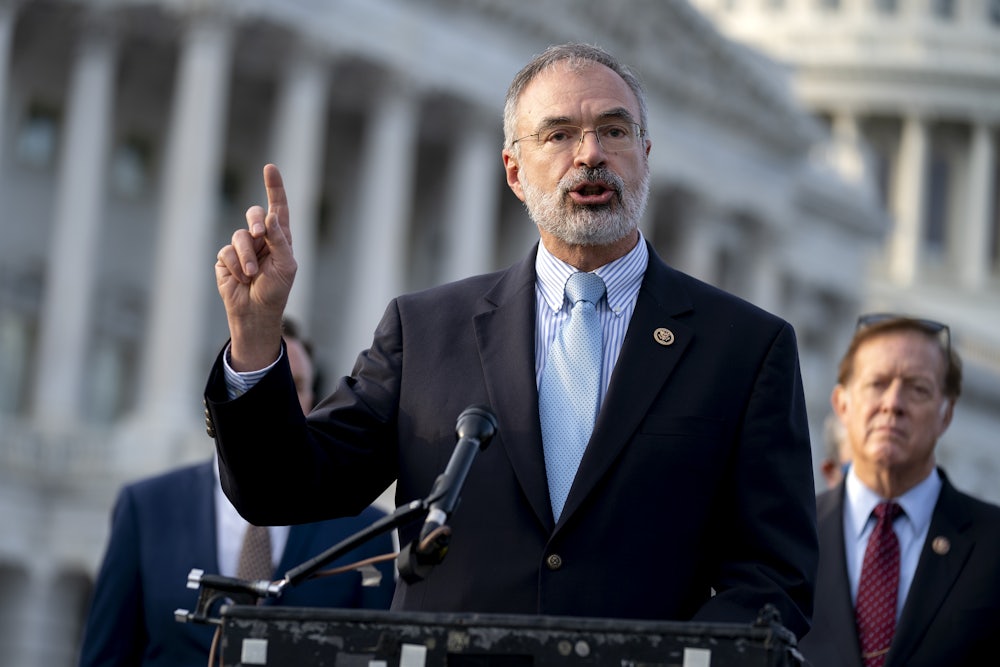On the surface, the House resolution put forward in April by Democrat Gerry Connolly and Republican Michael Turner looked like an uncontroversial enough measure supporting NATO efforts to bolster democracy in member countries. The resolution, which cited threats posed by “authoritarian regimes,” urged the Biden administration to uphold NATO’s “founding democratic principles.”
But Andy Harris, the six-term GOP House member from rural Maryland, objected strenuously to the measure as a slap against Hungary, a NATO member he has often championed despite its hard swerve toward authoritarian rule under Viktor Orbán. A member of the House’s far-right Freedom Caucus and co-chair of the Hungarian Caucus, Harris tried to torpedo the resolution during floor debate by attacking a provision that called for setting up a NATO unit to help its members build democratic institutions.
Harris, whose Hungarian father emigrated to the United States in the 1950s, was irked by a reference to “internal threats from proponents of illiberalism,” which he called a “left-wing dog whistle” aimed both at Poland and at Hungary, where Orbán has undermined his country’s judiciary, press, and universities—and has used the very word “illiberal” himself to describe the state he aspires to build.
Harris was one of 63 House Republicans to vote “no.” He went the extra mile to boost the “no” votes by demanding a roll-call vote after the resolution had passed on a voice vote, which led Republican Congresswoman Liz Cheney to label them representatives of the “Putin wing of the GOP.”
Harris’s attempts to block the resolution are a small slice of his aggressive advocacy for Hungary and Orbán in recent years and parallels other moves by conservatives to forge closer ties with Orbán that accelerated during Donald Trump’s presidency. The 65-year-old Harris, a physician by training, has become increasingly vocal this year in promoting Orbán’s hard-right policies and linking Orbán’s agenda with that of U.S. conservatives, as he did in a video address to a Conservative Political Action Conference in Budapest in May (where Orbán spoke as well) and in remarks to the Hungarian press, where Harris has heaped praise on Orbán.
Speaking to a Hungarian paper just days before Orbán addressed another CPAC event, in Dallas, in August, Harris lauded him for advocating “conservative policies, despite strong criticism of left-wing EU governments, which are closely aligned with the Republican Party’s platform for the next two election campaigns. In particular, on social issues and border security.” He added: “Viktor Orbán is right: Nations must defend their identities and borders, and Western civilization is based on Judeo-Christian values, especially the role and importance of the family.”
If the American right does manage to turn the U.S. into an Orbánesque illiberal democracy, history will note well the roles played by the likes of Tucker Carlson and CPAC leader Matt Schlapp. It will likely overlook Harris. It should not.
Harris has done yeoman’s work in public and behind the scenes to help bolster Orbán’s image and influence in the U.S. In 2018, for instance, Harris helped scuttle a State Department plan to provide up to $700,000 for independent media in Hungary, by rounding up signatures for a “Dear Colleague” letter. Harris painted the funding plan as a nefarious one to support “opposition media” and charged that it “distorted the record” of Orbán. Harris’s missive echoed criticism of State’s plan by Orbán’s government, downplaying the concerns of a Budapest-based U.S. diplomat who had warned publicly that journalists in the country faced “growing pressure and intimidation” and that the number of independent media outlets was “dwindling.”
The next year, Harris, Missouri GOP Representative Vicky Hartzler, and some Trump administration officials addressed an event at the U.S. Capitol that was sponsored by the Hungarian Embassy and dubbed the Second Annual Conference on Family Values. The conference sparked criticism from the Southern Poverty Law Center and some human rights organizations because it drew representatives from groups such as the Heritage Foundation and the Center for Family and Human Rights who have taken strong anti-LBGTQ positions.
And this May, in his video address to CPAC’s Hungary conference, which also featured Tucker Carlson, Harris slammed abortion rights backers and railed against dangers that he sees in “woke political correctness,” as well as “Marxism and Socialism.” Touting Orbán’s agenda, Harris ominously warned, “Our countries are each engaged in a renewed fight to remove these corrosive elements from our way of life, our classrooms, corporate boardrooms, entertainment events, and even the media.”
Harris’s unstinting praise for Orbán’s authoritarian style and policies seems consistent with the roles Harris played in efforts to overturn the 2020 election in the U.S. He was one of about 10 Freedom Caucus members, including Scott Perry, Jim Jordan, and Paul Gosar, who huddled with Trump, his lawyer Rudy Giuliani, and chief of staff Mark Meadows for about three hours at the White House on December 21, 2020, to brainstorm ways to block Joe Biden’s win, according to testimony given to the House select committee investigating the January 6, 2021, insurrection. That White House meeting featured discussion of a plan to “encourage members of the public to fight the outcome on Jan. 6,” as Representative Stephanie Murphy disclosed at one hearing.
When Congress voted to certify Biden’s win, Harris was one of 139 House members who voted “no” to accepting Biden’s victory in Pennsylvania, after speaking out loudly in opposition during a late-night debate on the House floor. Two weeks later, on the first full day of Biden’s presidency, Harris set off a metal detector trying to bring a gun onto the House floor. That is against House rules.
Some prominent House Democrats aren’t surprised by Harris’s aggressive moves to help Trump and Orbán. Representative Jamie Raskin of Maryland, a Democratic member of the House select committee probing the January 6 assault on the Capitol, told The New Republic that “there was a small coterie of right-wing Republicans helping Trump to execute plans to snatch victory from the jaws of his electoral defeat. Harris was definitely part of the group that was working to overturn the actual electoral vote.” Raskin added that Harris “has a natural affinity for social authoritarians. His politics smack strongly of European autocratic strongmen. It’s not surprising that his loyalties run to Viktor Orbán in Hungary and Donald Trump in America.”
Harris didn’t respond to requests for an interview for this article and declined to answer a few specific written queries about his vote to oppose Biden’s certification by Congress and the meeting he attended with Trump in late 2020. In a debate with Democratic challenger Heather Mizeur on Wednesday, Harris acknowledged that he attended the meeting and that he “would take the invitation again.” Pressed by reporters about it after the debate, he added: “It was not planning an insurrection. That’s all I’m going to say.”
During his six terms in the House as the only GOP member from Maryland, Harris has shown other palpable signs of far-right leanings in both his pro-Orbán advocacy and conservative domestic stances, which at times seem to overlap. For instance, Harris traveled to Hungary in 2019 to attend the 3rd Budapest Demographic Summit, where Orbán warned darkly about the dangers of “population migration” and Harris talked about Americans living longer, the rising costs of Social Security in the U.S., and the need to boost population at the “bottom of the social pyramid, which can only be achieved through childbirth.”
Harris was reportedly the only U.S. political figure to attend the summit except for a leader of the right-wing Family Watch International. Back in 2014, Harris drew criticism from the Human Rights Campaign, or HRC, as one of the most “anti-equality” members of the House who “go out of their way to oppose any step toward equal protection under the law or to protect LGBT Americans from violence, discrimination, and harassment.”
Although Harris promised in 2010 that he would leave politics after six terms, last year he shifted his stance, stating in a television interview that “the situation is very different from then. No one would have anticipated that we would have the pushback from liberals and socialists that we had then.” Harris added that “this fight is not over.”
Scholars and Hungary watchers voice dismay that Harris, along with other Freedom Caucus members and Trump, have proven to be useful allies in boosting Orbán’s image and influence in conservative circles and on the Hill, and see ample evidence that a mutual admiration society between Trumpworld and Orbán is flourishing. “Trump’s people are following Orbán’s playbook: Lead with culture wars to appeal to the base while you lock in power by changing the rules so that you never have to leave power,” Kim Scheppele, a Princeton professor of international affairs and Hungarian legal expert, told me. “Finding that a small country can play out a party’s preferred ideology and succeed in the world is intoxicating.… Orbán not only ‘owns the libs’ but controls everything that matters in Hungary. That power is irresistible to MAGA Republicans.”
Other experts on authoritarianism voice alarms about Orbán’s magnetic attraction for the U.S. right. “What’s distinctive and important about Orbán is that he is willing to use the power of the state to go after common enemies including immigrants, gays, and the press,” said Steven Levitsky, a Harvard professor of government and the co-author of How Democracies Die. “The European center-right has tolerated Orbán, but the U.S. right is cheering him on.”
In Harris’s case, his strong embrace of Orbán may partially be explained by his roots in Hungary and revelations that his father, Zoltan, a physician, belonged to a pro-Nazi Hungarian paramilitary group toward the end of World War II—revelations that have raised new questions about the veracity of Representative Harris’s public accounts of his father’s past. Over the years, Harris has spoken about how his father was taken to a Soviet gulag prison before the war ended. In 2012, for instance, at an event to honor Holocaust hero Raoul Wallenberg, who saved 100,000 Jewish Hungarians, an emotional Harris said, “My father is of Hungarian descent, and he was an anti-Communist who was sent to a Soviet gulag for two years.”
This account has drawn scrutiny, due to its omissions, from some prominent historians, including the late Eva Balogh, who taught Central European history at Yale for many years and was born in Hungary. Balogh, in 2021, published evidence in Hungarian Spectrum, an online newsletter she founded, that Zoltan Hariss (one alternate Hungarian spelling) after the war faced criminal charges for being a member of Keleti Arcvonal Bajtársi Szövetség, or KABSZ, a Hungarian paramilitary group that was founded in 1939 by Karoly Ney, a Hungarian admirer of the Nazi regime. A few years later, according to Balogh, KABSZ became a group of storm troopers allied with the political party in Hungary that played a role in helping the pro-Nazi regime that came to power in 1944.
Balogh wrote that she had found an old announcement in the Hungarian paper Magyar Nemzet on March 3, 1948, stating that “the people’s prosecutor’s office indicted Dr. Zoltán Hariss, a physician, for crimes against the people because, as a member of the Keleti Arcvonal Bajtársi Szövetség, he assisted the rule of the Szálasi regime.” That’s a reference to Ferenc Szálasi, the head of the far-right Arrow Cross Party, who came to power in October 1944 after longtime Hungarian leader Miklós Horthy signed an armistice with the Allies and was arrested by the Germans. According to the Holocaust Encyclopedia of the U.S. Holocaust Memorial Museum, Arrow Cross gangs “perpetrated a reign of arbitrary terror against the Jews of Budapest” and ordered 70,000 Jews into a 0.1-square-mile ghetto.
Balogh’s account of Zoltan Hariss’s dark past is based partly on the work of other Hungarian scholars, and she acknowledged that details of what Hariss did in the war and his role with the paramilitary outfit are not fully known. She writes that Zoltan Hariss was captured at some point in late 1944 or early 1945 by Russian forces, during “house to house” battles in Budapest, and sent to a Soviet labor camp. Zoltan Hariss returned to Budapest in 1947 after his release, according to Balogh, and by April 1948 had been “convicted” but given a “light sentence,” serving about eight months in jail. Balogh wrote that based on his sentence, she suspected Zoltan Hariss’s role in the paramilitary group was “minor.” According to official documents relating to his trial obtained by Balogh, Hariss at one point said that he served the KABSZ as a doctor and that his service was short-lived.
Balogh stressed that Zoltan Hariss was “never a forced labor inmate in the Gulag” but was there due to his involvement with “a very bad cause” and “ultimately served under the Hungarian branch of the SS.” She acknowledged that Andy Harris may not be “entirely familiar with the true story of his father’s involvement with the Hungarian Nazi movement,” but added that if he is “ignorant of his family history, it would be high time to learn the true facts.”
Other scholars point out that many members of the KABSZ suffered similar fates after the war. “Many of those who fought the Soviets, including those in the KABSZ like Harris’s father allegedly was, were taken prisoner of war and spent time in Soviet prisons,” Scheppele said. “Many were brought back to Hungary and tried after the war.”
Andy Harris’s office did not respond to a query about Balogh’s revelations about his father. His family history probably isn’t on his mind much now, however, as Election Day nears, and he’s expected to win another term in his heavily GOP-leaning district.
Another two years in the House for Harris means that Orbán’s authoritarian policies, and Trump’s false charges that the 2020 vote was rigged, are likely to be promoted even more by one of the House’s lesser-known far-right members. He deserves more public exposure.






